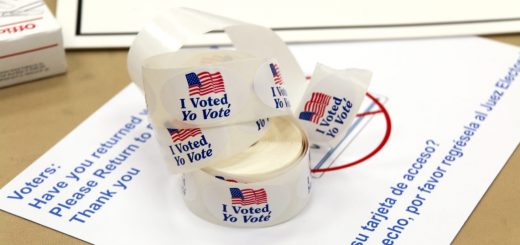A breakdown of the electoral college
On November 3, 2020, millions of Americans across the country voted for the next president. It is now November 6, and no news source has projected a winner. As people around the world anxiously await the results, many have become curious about the election process. I sat down with AP Macroeconomics and AP Government and Politics teacher Jeffrey Stewart to clarify the election process and the role of the electoral college. Below is a transcript of my interview, edited for length and clarity.
Diya Thomas: So as we know, the election is going on right now and people are anxiously waiting for the results. And so we at the Crier wanted to do an article about the electoral college. Like, you know, how it works, what is it, and what its role is? My first question is: what is the electoral college?
Jeff Stewart: The electoral college is how we elect the president of the United States. Alexander Hamilton was the primary author of the portion on the electoral college, and what it did was it sought for a mechanism to elect the president. And it’s really one of those Hamiltonian-Jeffersonian debates. On one hand, you have Hamilton’s belief that there should be a professional class of people that make choices. And on the other hand, you had Jefferson’s position that the typical yeoman farmers should be able to make their own decisions. The electoral college is a great example of how Hamilton would want that view played out.
So the electoral college has changed over time. But really you’ve got to think about 1789 after the constitution is ratified. I mean, I would imagine that the typical person in, say, South Carolina knew who George Washington was or a typical person in New Hampshire knew who George Washington was. But does a typical person in South Carolina know who John Adams is? Regionally, you would know who he was. He was from Massachusetts, but, you know, information at that time is so different. So that’s why the electoral college was designed so that that person in South Carolina could choose somebody to choose the president on their behalf.
If you think about what the electoral college does now, it awards votes for president based on the numbers of senators and representatives your state has. So if you think about it, and then you go back and you look in the Constitution, you say there’s the three-fifths compromise, right? Each slave was counted as three-fifths of a person for the purposes of representation, right? So that means that in 1789, states like Virginia, South Carolina- they had more electoral votes because they had more slaves. The slavery legacy was part of that mechanism to elect the president. I mean, we do it differently now with 48 states and the district of Columbia, [who] vote with the winner takes all systems. And there’s the way Nebraska and Maine award their votes. Under their state law, they award it proportionally. So if you win the state’s popular vote, you get to have two of their electors. Then they award the rest of their electoral votes based on the population in the congressional districts.
Diya Thomas: So you mentioned that there are actual voters in the electoral college. Who gets chosen to vote? How’s that decided?
Jeff Stewart: So the electors cannot be officeholders, and because we do it in this way where there’s a Democratic slate and a Republican slate, the position will usually go to party loyalists. So you have to name these people in advance. Those electors are supposed to go vote for you. In some states, the electors can vote for whoever they want. In other states, there’s actually a law that says that they’re bound to vote for that candidate that they’re supposed to vote for. And they would actually be punished if they do not do that. In the 2016 election, there were seven “faithless electors.” There were seven electors that instead of voting for who they were supposed to do, they voted for somebody else, and you can do that. So you can vote for whoever you want.
Diya Thomas: So then to determine the outcome of the election, like who wins the presidency, is that solely based on basically the electoral college?
Jeff Stewart: Yes. Americans cast their vote, and then it gets counted, and you have this election. And it wouldn’t surprise me if this weekend the media reports a winner, but that’s the media. That’s not an official count. And that’s part of what citizens should be able to understand. And at some point in the American tradition–and this isn’t just for president, this is for all races–the loser concedes the election. It’s kind of like the expression “the majority gets to govern based on the consent of the minority.” And so you can look at examples. Look at George H.W. Bush. In 1992, he graciously accepted the election, the loss. And I believe you look at his quote, he said, “We all need to get behind this president.” In 2000, it was very intense in the state of Florida. But in the end, Al Gore said, “I don’t agree with what the Supreme court did. However, I accept it.” And that’s an American tradition that helps the nation heal and move forward. So you would hope that all candidates for office would do that.
Diya Thomas: So whatever is shown on the news, they’re just projections; they’re not the 100% actual results, correct?
Jeff Stewart: Correct. Yeah, they’re just reporting what they see. I mean, you can go online and look at the Illinois election results page; you can go and look and see it all. That’s where [news sources] are getting their information. When the state election boards, when they get this information, they will obviously post it publicly somewhere, but they probably also, I don’t know this for sure, but they probably, you know, send it to the major media outlets.
Diya Thomas: Then why do some sources say something different, like with their projections? So AP called Arizona for Biden, but then CNN still hasn’t called it.
Jeff Stewart: You’re talking about journalism for that. So now that’s a separate story. So if you want to talk about journalism, it’s really interesting because you have journalists, but you also have the corporation. The journalists have jobs because their media outlet is a business. They’ve got to make money. So how do you make money in journalism? You have to, you know, you got to get the scoop, right? You gotta be first to it. You gotta have the story and you’ve gotta attract viewers or readers to your outlet. And so some of it is competitive just in that regard. They want to be the first ones to say that they did it. Usually, the Associated Press is seen as your most accepted media outlet for these things. And there was a story last week and on NPR, where they interviewed the guy for the Associated Press who’s responsible for releasing these things. And he talked about all these different metrics that they use to determine when and why they will say they’ll go public with a winner. So AP is commonly seen as this middle ground. You know, they just report the news, and they don’t have a particular bias one way or the other. And that’s why most Americans seem to accept that. But when Fox did it, or CNN does this, or NBC does that? Now you’re talking journalism, and they’ve made mistakes. I mean, I remember watching in 2000 in Florida, when they got it wrong and they announced the winner, and then they had to pull it back. That is bad journalism. You don’t want to have to retract a story or something like that. So it just made them look bad. And that’s why you want to make sure you get it right.
Diya Thomas: Okay. Almost done. This is, I think a little bit more of an opinion, but is the electoral college necessary, and what would happen if we got rid of it?
Jeff Stewart: I started talking about this four years ago. The electoral college is like the rules of the game, you know what I mean? It’s like when you play a game, you play by the rules. And so when you run for president, you run under the rules of the electoral college. To explain this from four years ago, people didn’t like that Hillary Clinton won the popular vote, but Donald Trump won the presidency through the electoral college. Donald Trump’s objective is not to win the popular vote. Your objective is to win the presidency, and you might not like the electoral college. But that’s the rules of the game. And the other thing is there’ve been 58 presidential elections, and the popular vote and the electoral college vote have not aligned up only five times. So if you look at the electoral college from that perspective, you would say that it’s performed pretty well. That’s another thing that the media looks at. The fact that any media outlet says, ‘Oh yeah, here are the popular election results.’ Well, why are you posting that? That’s not how you win the presidency, but you’re posting it as a talking point.
The other problem is how are you going to change it? Obviously, an amendment to the constitution is difficult to make. It’s not impossible, but it’s difficult. And if you look at population trends in this country, you’re going to see that the electoral college will favor the Republican candidate more so than the Democratic candidate in the future. So I don’t necessarily see if there would be broad support nationally for moving to a popular vote, if that is the case, but that’s obviously the most popular plan.
Well, why don’t we just do a popular vote? Okay. There’s something called the popular vote interstate compact. And it says that any state that does this, they will award all of their electoral votes to that candidate that wins the national popular vote. Okay. So think about that. And if that actually goes forward, the number of states that you would need to sign on to that would just have to equal 270 electoral votes. So it becomes probably a more plausible avenue for changing the electoral college.
Diya Thomas: Okay. So last question. All the news outlets, they’ll give their projections this weekend, maybe even earlier. Is there a chance that they can be wrong?
Jeff Stewart: Yes. I mean, the electoral voting takes place on December 15, and if you’re talking about when the electoral votes are actually cast, it’s January 6. Mike Pence will be responsible for officially counting the votes because he is vice president and the president of the Senate. The only concern would be about those faithless electors–do people show up and vote for somebody different?
And it isn’t necessarily about voting for somebody different. In 2000, Al Gore lost an elector because the elector chose to abstain from voting in a matter of protests as to what happened in Florida. Personally, a faithless elector is dangerous. I mean, that’s not what the citizens in the state voted for. They didn’t vote for you to go vote for whoever you wanted. They voted for you because they thought you were going to go vote for the candidate.
Diya Thomas: I think that those are all the questions I have about the electoral college. I think that makes a lot more sense now. Thank you for sitting down with me and explaining this whole process.
Jeff Stewart: No problem.





Recent Comments